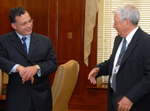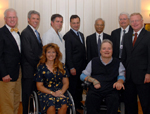|
|
|

|
Spinal cord injury expert shares research
|
by Cindy Abole
Public Relations
The MUSC research community learned the latest developments about a
promising hypothermia trial to treat acute spinal cord injuries during
the July 8 visit of a leading researcher with The Miami Project.
 Dr. Allan Levi,
left, is met by Dr. Tom Higerd and the South Carolina Spinal Cord
Injury Research Fund's Board of Directors as part of Levi's July 8
visit to MUSC. Dr. Allan Levi,
left, is met by Dr. Tom Higerd and the South Carolina Spinal Cord
Injury Research Fund's Board of Directors as part of Levi's July 8
visit to MUSC.
Allan D. Levi, M.D., Ph.D., professor of neurosurgery and chief of the
neurospine service at Jackson Memorial Hospital, spoke at a recent
Department of Neurosciences Grand Rounds and met with the South
Carolina Spinal Cord Injury Research Fund’s (SCIRF) board. He came to
highlight the results of a hypothermia trial that he and colleagues at
the University of Miami Jackson Memorial Medical Center conducted.
The trial involves systemic intravascular cooling by introducing a cold
saline solution to decrease damage to the spinal cord in severe cases
of cervical spinal cord injury patients. The treatment also may be
neuroprotective in that it decreases the severity of injury and
increases function in patients. Other clinical reports have
demonstrated the use of cooling on patients with head injury, stroke
and cardiac arrest, but presented no established standards of care for
those with spinal cord injuries. Levi and his research team’s findings
were published in the April issue of Neurosurgery.
Levi’s visit was coordinated under the guidance of Brian G. Cuddy,
M.D., a Lowcountry neurosurgeon and SCIRF board chair. In addition to
his grand rounds talk, Levy focused on education and the national
research mission of The Miami Project in advancing knowledge and
treatments in spinal cord injury research.
Cuddy said that the visit served as a catalyst.
“Levi’s visit as a world-renown investigator in this specialty area is
motivating and reminds each of us that there is no magic bullet or pill
available to reverse its effects,” he said. “Instead, we need to focus
on how small steps mark progress and can provide better outcomes for
patients. We can’t afford to miss opportunities that involve MUSC
research and collaboration such as with this type of specialty
treatment and improved outcomes.”
 Attending the S.C.
Spinal Cord Injury Research Fund meeting are: Drs. Byron N. Bailey,
back row from left, W. Daniel Westerkam, Brian G. Cuddy, Allan Levi,
Naren Banik, Higerd and Mark Sothmann. Front row: Catherine Leigh
Graham and Dr. James S. Krause. Attending the S.C.
Spinal Cord Injury Research Fund meeting are: Drs. Byron N. Bailey,
back row from left, W. Daniel Westerkam, Brian G. Cuddy, Allan Levi,
Naren Banik, Higerd and Mark Sothmann. Front row: Catherine Leigh
Graham and Dr. James S. Krause.
According to Levi, Cuddy and other researchers, the incidence of spinal
cord injuries in the Palmetto State are on the rise and are higher than
the national average. This is attributed to driving accidents and
alcohol-related incidents, according to Cuddy.
It also is impacted by the state’s elderly population, which is more
prone to falls, has more complications with arthritis and degeneration
of the spine, engages in more active lifestyles that might lead to
injury, and is reaching an age where the ability to recover well is
being lost. Today, clinicians and researchers are focusing on better
treatment for older patients, according to Levi.
Levi leads a team of researchers to develop clinical protocols with The
Miami Project at the University of Miami Miller School of Medicine,
which is conducting extensive research on applying this therapy to
humans. Jackson Memorial Medical Center is the only institution
currently conducting regimented hypothermia treatment and follow-up for
patients with acute spinal cord injury.
“So far, the hypothermia provides a promising new treatment without a
high complication profile compared with treatments with other
neurological outcomes. There’s enough enthusiasm in our efforts to
forge ahead to the next step and develop a multi-center study and
involve and recruit other institutions,” Levi said.
Although MUSC is not participating in this trial, researchers may
collaborate with Levi and his Miami Project colleagues in other areas
of cell transplantation research, an understanding of human Schwann
cells and drug development.
The SCIRF was created July 20, 2000, by the South Carolina legislature
to provide research leading to improved specialized care and
rehabilitation services of South Carolinians with spinal cord injuries
and disease. The program fosters collaboration in the areas of basic
science research and clinical science to conduct translational research
that will improve their overall quality of life.
Friday, July 23,
2010
|
|
|




